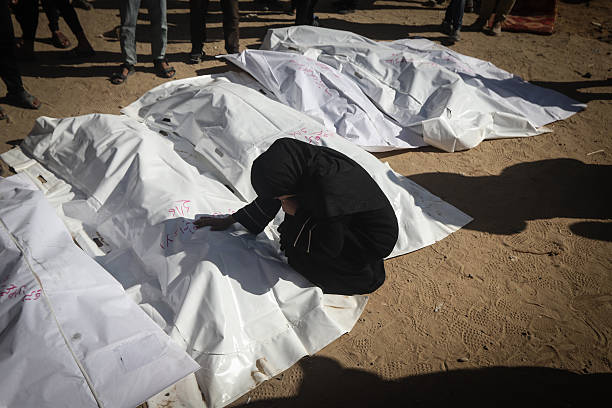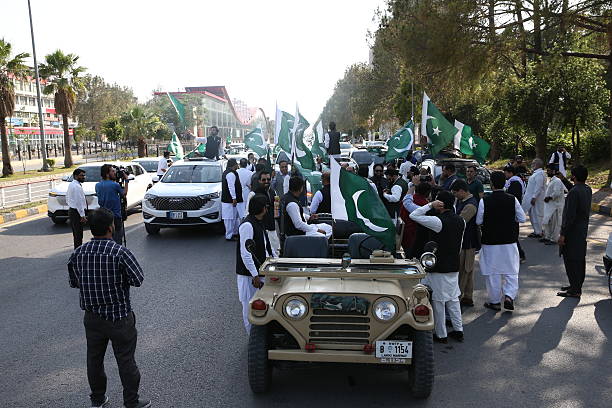Israel Launches Major Airstrikes in Gaza and Yemen Amid Hostage Crisis and Trump’s Mideast Visit
Israel launched deadly airstrikes across Gaza and Yemen amid escalating pressure on Hamas to release hostages, as humanitarian conditions in Gaza worsened during President Trump’s Middle East visit.
 GAZA CITY, GAZA - MAY 16: Loved ones and relatives of Palestinians, who lost their lives in Israeli attacks on Northern Gaza, mourn for their deceased ones at Indonesia Hospital in Gaza City, Gaza on May 16, 2025. It was reported that more than 100 Palestinians lost their lives in the attack. (Photo by Khames Alrefi/Anadolu via Getty Images)
GAZA CITY, GAZA - MAY 16: Loved ones and relatives of Palestinians, who lost their lives in Israeli attacks on Northern Gaza, mourn for their deceased ones at Indonesia Hospital in Gaza City, Gaza on May 16, 2025. It was reported that more than 100 Palestinians lost their lives in the attack. (Photo by Khames Alrefi/Anadolu via Getty Images)Israel launched a series of intense airstrikes across the Gaza Strip on Friday, killing 108 people—mostly women and children—according to Gaza health officials, in what Israeli authorities described as a prelude to a broader military campaign aimed at pressuring Hamas to release hostages. Simultaneously, Israeli forces struck two ports in Yemen, targeting the Iran-backed Houthi group, killing one and injuring nine, local health officials said.
The latest wave of violence comes after days of airstrikes that killed over 130 people in Gaza, as reported by the Gaza Health Ministry, which does not differentiate between civilians and militants. The strikes coincided with the conclusion of U.S. President Donald Trump’s trip to the Middle East, which included visits to Gulf states but not Israel. There had been international hopes that Trump’s presence in the region might foster a ceasefire or restore humanitarian aid, which Israel has blocked for over two months.
In his remarks from Abu Dhabi, Trump acknowledged the crisis in Gaza, stating, “We’re looking at Gaza. And we’ve got to get that taken care of. A lot of people are starving. A lot of people are — there’s a lot of bad things going on.”
The Gaza Health Ministry said Friday’s airstrikes resulted in the deaths of 31 children and 27 women, with hundreds more wounded. In southern Gaza, Israel struck Deir al-Balah and Khan Younis, targeting anti-tank missile posts and military sites. Dr. Ahmed al-Farra, head of pediatrics at Nasser Hospital, reported the deaths of three children and their grandfather as they fled from the bombardment in Khan Younis.
Northern Gaza also saw strikes in Jabaliya and Beit Lahiya, displacing residents. Israel said it had eliminated militants operating from an observation compound. Smoke plumes were seen over Jabaliya as people fled using cars, on foot, and in donkey carts.
Feisal Al-Attar, displaced from Beit Lahiya, described the chaos: “We got out of the house with difficulty, killing and death, we did not take anything.”
Following the Yemen strikes, Israeli Prime Minister Benjamin Netanyahu warned, “There will be more to come.” The Israeli military stated it had previously intercepted missiles launched from Yemen during Trump’s regional tour and had struck Houthi targets earlier this month.
An Israeli official, speaking on condition of anonymity, said the strikes in Gaza were part of a ramp-up to a major operation if Hamas does not release the 58 remaining hostages taken during the October 2023 attack. Netanyahu earlier vowed to intensify military action to dismantle Hamas, which has governed Gaza for nearly 20 years. On Friday, Defense Minister Israel Katz confirmed that Israeli forces had targeted Mohammed Sinwar, alleged leader of Hamas’ military wing in Gaza and brother of slain leader Yahya Sinwar. There was no confirmation of his fate.
A group representing the families of hostages urged Prime Minister Netanyahu to collaborate with Trump’s mediation efforts. On Monday, Israeli-American Edan Alexander was freed through undisclosed U.S.-Hamas diplomacy.
The war began with the October 7, 2023, Hamas-led assault that killed 1,200 Israelis and saw 251 hostages taken. Since then, Israel’s retaliatory campaign has claimed over 53,000 Palestinian lives, according to Gaza’s Health Ministry, including nearly 3,000 killed since a ceasefire ended on March 18. Of the remaining hostages, Israeli authorities believe up to 23 are still alive.
As Israel’s blockade of Gaza enters its third month, humanitarian conditions continue to deteriorate. In Khan Younis, crowds gathered at a charity kitchen, desperate for food. Children cried behind metal barriers, and workers were overwhelmed by the surging crowd.
“Our only hope was that Donald Trump’s visit to the Middle East would result in solutions and somehow open crossings to bring in humanitarian assistance as soon as possible into the Gaza Strip,” said Saqer Jamal, a displaced man from Rafah.
The United Nations reported that 18 charity kitchens had reopened using shared food stocks. A newly announced U.S.-backed humanitarian group, the Gaza Humanitarian Foundation, said it expects to start operations by the end of the month, citing agreements with Israeli officials. However, the U.N. and other humanitarian organizations have expressed concerns, saying the new system may not adhere to humanitarian principles or meet Gaza’s needs.
Associated Press writers Tia Goldenberg and Sam Mednick in Tel Aviv and Zeina Karam in Beirut contributed to this report.







Conversation